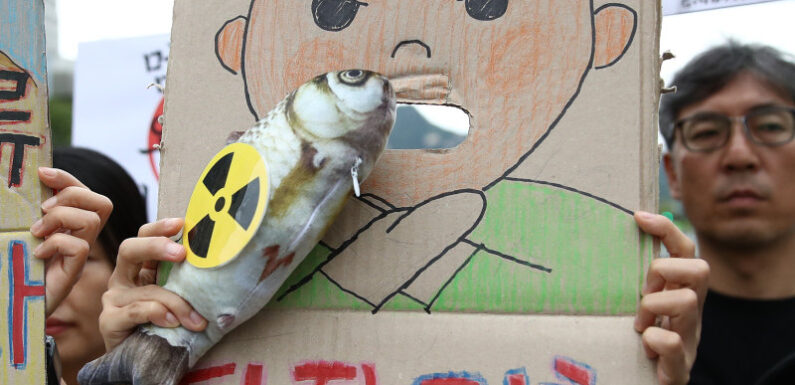
Save articles for later
Add articles to your saved list and come back to them any time.
Tokyo: Japan has started releasing treated radioactive water from the wrecked Fukushima nuclear power plant into the Pacific Ocean, triggering protests across the country and beyond and seafood import bans.
The polarising move to start dumping the water prompted China to announce an immediate blanket ban on all Japanese seafood imports, while bans in South Korea will remain in place.
China is “highly concerned about the risk of radioactive contamination brought by […] Japan’s food and agricultural products exported to China,” a Chinese customs official said in a statement.
South Korean protesters decry the Japanese government’s decision to release the Fukushima water on Thursday. Credit: Getty
Signed-off two years ago by the Japanese government and approved by the UN nuclear watchdog last month, the discharge is a key step in a dauntingly long and difficult process of decommissioning the Fukushima Daiichi plant after it was destroyed by a tsunami in 2011.
Plant operator Tokyo Electric Power said the release began about 1pm Tokyo time. It said it had not identified any abnormalities with the seawater pump or surrounding facilities.
However, China reiterated its firm opposition to the release and said the Japanese government had not proved the legitimacy of the water discharge.
“The Japanese side should not cause secondary harm to the local people and even the people of the world out of its own selfish interests,” China’s Foreign Ministry said in a statement.
Tokyo in turn criticised China for spreading “scientifically unfounded claims”.
It maintains the water release is safe, noting that the International Atomic Energy Agency has also concluded that the impact it would have on people and the environment was “negligible”.
The plant was destroyed after a massive 9.0 magnitude earthquake generated powerful tsunami waves that caused the meltdowns of three of its reactors.
Japanese fishing groups, hit with years of reputational damage from radiation fears, have long opposed the water release.
An aerial view shows the storage tanks for treated water at the tsunami-crippled Fukushima Daiichi nuclear power plant in Okuma town, Fukushima prefecture, Japan.Credit: Reuters
“The fishing communities of Japan are feeling increasingly anxious as they witness this moment” despite the government’s assurances, the head of the Japan Fisheries Co-operative said in a statement.
Japan exported about $US600 million worth of aquatic products to China in 2022, making it the biggest market for its exports, with Hong Kong second. Sales to China and Hong Kong accounted for 42 per cent of all Japanese aquatic exports in 2022, according to government data.
South Korean Prime Minister Han Duck-soo said import bans on Fukushima fisheries and food products would stay in place until public concerns were eased.
The water will be released in smaller portions initially and with extra checks. The first discharge totalling 7800 cubic metres – the equivalent of about three Olympic swimming pools of water – will take place over about 17 days.
Korean protesters participate in a rally against the Japanese government’s plan to dump radioactive wastewater from the damaged Fukushima nuclear power plant into the Pacific Ocean, in Seoul, last week.Credit: Getty
Civic groups launched protests in Japan and South Korea, although South Korea’s government has said its own assessment found no problems with the scientific aspects of the release.
South Korean police arrested at least 14 protesters who entered the Japanese embassy in Seoul, according to an organiser and a Reuters witness.
“The sea is not Japan’s trash bin,” read one of the protest banners. “Stop releasing contaminated water at once.”
A few dozen protesters also gathered in front of Tokyo Electric Power’s headquarters and on the beach near the plant on Thursday, holding signs reading “Don’t throw contaminated water into the sea!” The rally was over in about an hour.
“The Fukushima nuclear disaster is not over. This time only around 1 per cent of the water will be released,” 71-year-old Jun Iizuka said.
“From now on, we will keep fighting for a long time to stop the long-term discharge of contaminated water.”
Reuters
Get a note directly from our foreign correspondents on what’s making headlines around the world. Sign up for the weekly What in the World newsletter here.
Most Viewed in World
From our partners
Source: Read Full Article


